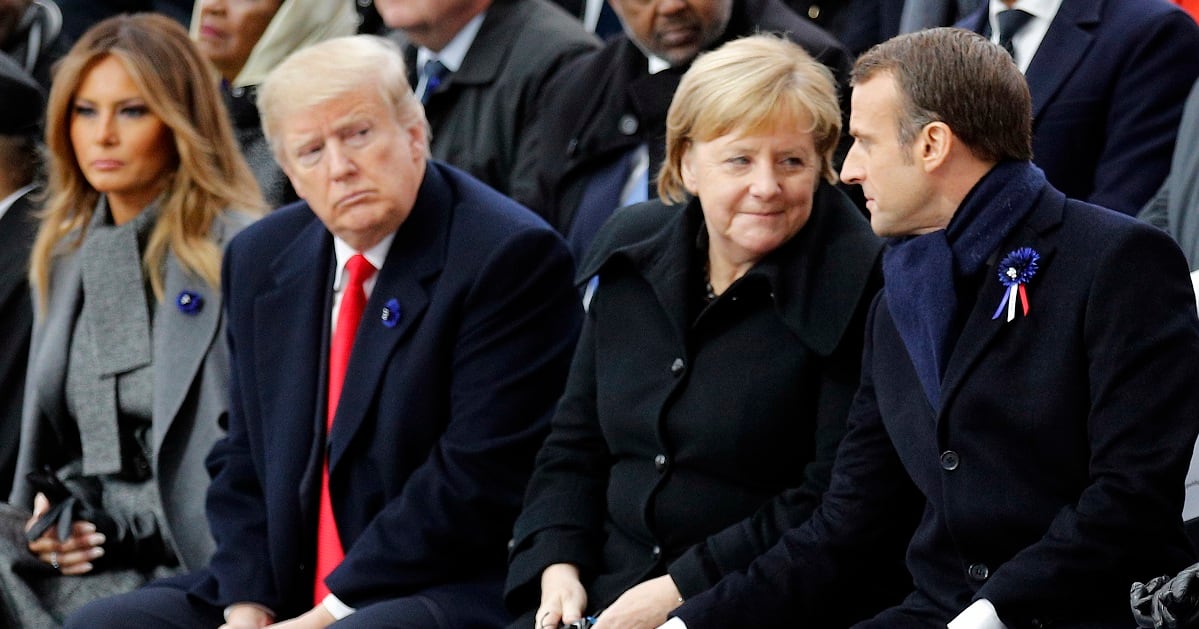President Donald Trump on Monday unloaded on the U.S.’s European allies, and appeared to threaten to pull out of NATO, upon returning home from a World War I memorial event in Paris, where French President Emmanuel Macron openly rebuked Trump’s political philosophy in a speech the day before.
Trump returned to his old talking points — that the U.S. is treated unfairly within NATO while maintaining trade deficits with those countries — as Macron talked up the idea of a European army that would, in part, serve to protect the continent from the U.S.
Trump described the idea, which Macron floated before the U.S. president’s visit to Europe. as “very insulting.”
“Just returned from France where much was accomplished in my meetings with World Leaders,” Trump tweeted Monday morning.
“Never easy bringing up the fact that the U.S. must be treated fairly, which it hasn’t, on both Military and Trade,” he continued. “We pay for LARGE portions of other countries military protection, hundreds of billions of dollars, for the great privilege of losing hundreds of billions of dollars with these same countries on trade.”
Trump typically condemns any kind of trade deficit with any country, though the metric often indicates the U.S. has a strong economy that can afford to buy more from a given country than that country can buy from the U.S.
“I told them that this situation cannot continue,” Trump said of the military and trade relationships with some of the U.S.’s closest allies. He described the situation as “ridiculously unfair.”
The U.S. by far spends the most in NATO, both on its own defense budget and on programs to increase the readiness and capabilities of its European allies.
In 2014, NATO countries agreed to raise their defense spending to 2 percent of gross domestic product by 2024. So far, only five countries — mainly in eastern and central Europe where the threat of Russia looms large — have met that pledge.
Since his campaign days, Trump has demanded NATO countries meet that 2 percent figure, or even double it, immediately.

Germany, Europe's biggest economy, has expressed little interest in hitting that benchmark.
The metric of percentage of GDP spent on the military can also be deceptive. Defense spending has broad and differing definitions around the globe.
Greece is one of the few NATO countries that meet the 2percent spending mark, but it spends much of that on pensions.
NATO’s newest member, Montenegro, could spend 2 percent of its GDP on defense, which would be only $95 million, little more than the cost of one U.S. Air Force F-35.
NATO pullout?
Trump on Monday also lamented the money the U.S. has spent protecting other countries, saying the U.S. gained nothing from the alliances other than “Deficits and Losses.”
“It is time that these very rich countries either pay the United States for its great military protection, or protect themselves … and Trade must be made FREE and FAIR!” Trump concluded, appearing to wave the idea of a U.S. pullout from NATO.

Article 5 of the NATO treaty, the alliance’s key clause that guarantees a collective response to an attack on a member state, has been invoked only once in NATO’s history: after the September 11, 2001, terrorist attacks on the U.S.
The result was a collective response from NATO countries that still have forces fighting and dying alongside U.S. forces in Afghanistan today.
MORE FROM BUSINESS INSIDER
♦ Here’s how NATO’s budget actually works
♦ The Trump-Macron bromance appears dead as Trump launches into tirade against the French leader





